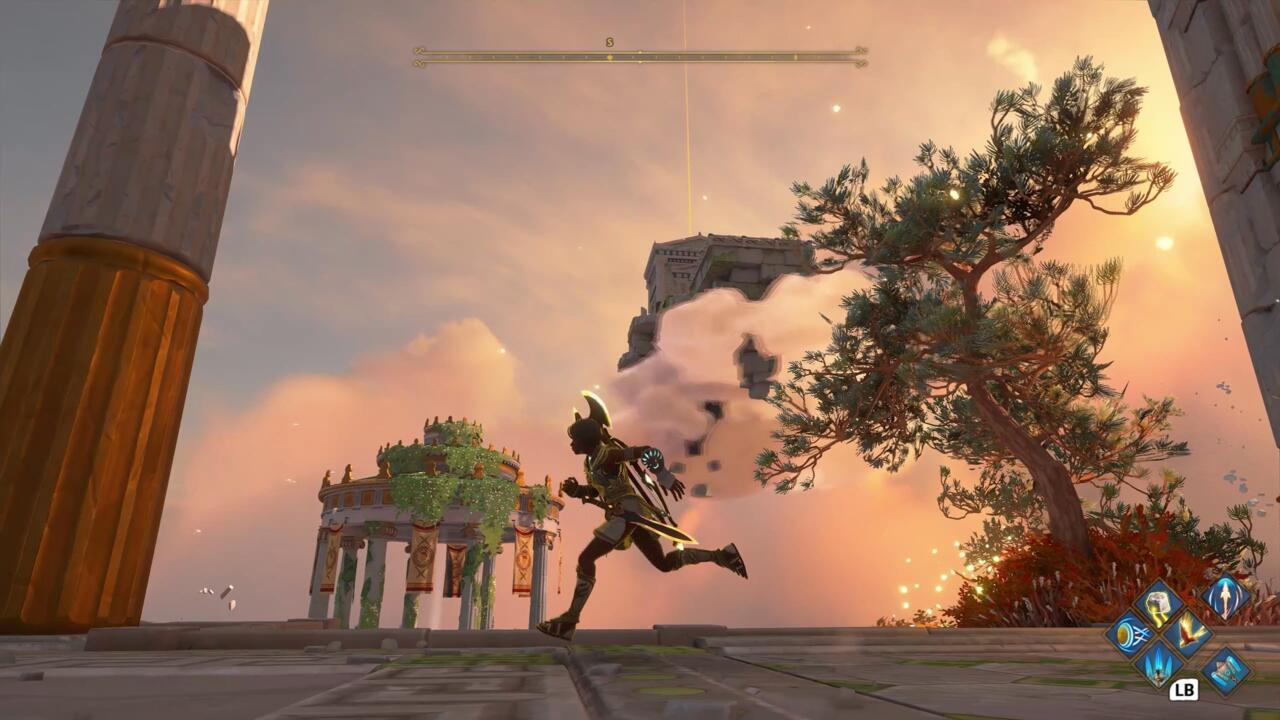Immortals Fenyx Rising's first major DLC, A New God, feels like it's calling a bluff. Ubisoft's open-world template has gotten flack over the years for turning its sprawling worlds into a sea of icons that push you to beeline it to the next objective. If that's gotten stale, why not cut out the "open world" part? That's more or less what A New God does: It abandons any pretense about these games being about discovery and traversal in favor of a set checklist of challenges. The idea works in concept; the self-contained puzzles were some of my favorite parts of Immortals, so this DLC is in some ways exactly what I wanted. It, unfortunately, doesn't work as well in practice. Although it introduces some clever ideas to tease your brain, the way these ideas are implemented are extremely hit-or-miss, as agonizingly inconsistent and frustrating as it is clever.
A New God doesn't spend much time getting you up to speed with its story or gameplay, so you should probably finish the base game before you jump in. After the events of Immortals, Fenyx is ready to ascend into the pantheon of gods they'd helped free from Typhon--as soon as they prove themselves worthy by completing a number of puzzle and combat trials designed by said gods in Olympos.
I'm surprised by how little I miss the parts of Immortals that A New God trims. You don't explore Olympos much, since it's more of a hub than a world. Immortals' eye-rolling humor (which still can't land a punchline most of the time) is also thankfully easier to ignore than it is in the base game, as it's delivered almost entirely through quips from the gods trying to amuse you or impart advice as you play.

Instead, A New God's trials quickly throw some new tools at your disposal, like magnetic beams, portals, spheres that instantly replenish stamina, and the ability to swap places with a statue of yourself. These ideas build on the tools you already have, and putting them together in the same puzzle makes for some fun brainteasers; one trial might have you using portals and switches to move a couple of spheres around a maze, while another has you running an obstacle course while also shifting moving platforms around to make sure the ball you launched at the start can follow you. A lot of them are conceptually clever and fun to execute, but once I grokked each tool’s general purpose, these puzzles didn't push me outside my comfort zone much. I didn't get stuck all that often, but I also didn't have too many of those magical a-ha moments that made me feel like a genius, either.
The bigger problem is that many of the new puzzles rely on Immortals' unwieldy physics to a fault. Several trials have you whacking objects with your hammer or chucking large metal cubes around. These puzzles are wildly inconsistent; standing next to a metal ball and charging up your hammer might thwack it straight up and over a wall (exactly what you were hoping), while scooting just hair backward might chuck it into the abyss at a 45-degree angle (not at all what you wanted). Throwing a giant wooden block over a gap and onto a platform has a good chance of breaking it altogether based on the angle it lands--something you can't control all that well, and which is immensely frustrating when the game is all but telling you to throw that block.
These bouts of random trial and error are compounded by how elaborate some of the puzzles can be, and a broken cube can often mean having to move all the pieces again so you can try that throw again and cross your fingers. At its worst, solving these puzzles felt like rolling a heavy boulder up a steep hill, only for a gust of wind to somehow knock the thing into the ocean. It often took far too long after I'd solved a puzzle in my head to put that solution in action, and I had to hope that when I implemented it, the physics would work in my favor.
Oddly enough, I was able to just skip a few puzzles outright with some lateral thinking. A New God gives you an additional jump and a boost to your stamina; since most areas where trials take place are isolated islands that aren't usually walled off, sometimes the path of least resistance is literally jumping over a puzzle.

A few of the trials also involve fighting your way through waves of monsters, but they're largely filler. Potions are considered cheating in Olympos, so you can't just fill up on them and brute-force fights, which is a nice change of pace that forced me to think more critically during fights. Unfortunately, only a few of these fights offer anything meaningfully different from the base game. Considering all the new tools I had at my disposal, it's disappointing that most fights didn't take advantage of them or introduce twists of their own.
The structure and new ideas in A New God are promising: Despite my frequent frustrations with its physics and many of the puzzles, I had a decent time barreling through all these puzzles without having to discover them on a huge map. But it's hard to ignore how haphazard it felt, the trepidation I experienced trying a solution I knew would work only to have it go wrong for reasons out of my control.